
Beetles are insects that form the order Coleoptera, in the superorder Holometabola. Their front pair of wings are hardened into wing-cases, elytra, distinguishing them from most other insects. The Coleoptera, with about 400,000 described species, is the largest of all orders, constituting almost 40% of described insects and 25% of all known animal species; new species are discovered frequently, with estimates suggesting that there are between 0.9 and 2.1 million total species. Found in almost every habitat except the sea and the polar regions, they interact with their ecosystems in several ways: beetles often feed on plants and fungi, break down animal and plant debris, and eat other invertebrates. Some species are serious agricultural pests, such as the Colorado potato beetle, while others such as Coccinellidae eat aphids, scale insects, thrips, and other plant-sucking insects that damage crops. Some others also have unusual characteristics, such as fireflies, which use a light-emitting organ for mating and communication purposes.

The ring ouzel is a mainly European member of the thrush family Turdidae. It is a medium-sized thrush, 23–24 centimetres (9.1–9.4 in) in length and weighing 90–138 grams (3.2–4.9 oz). The male is predominantly black with a conspicuous white crescent across its breast. Females are browner and duller than males, and young birds may lack the pale chest markings altogether. In all but the northernmost part of its range, this is a high-altitude species, with three races breeding in mountains from Ireland east to Iran. It breeds in open mountain areas with some trees or shrubs, the latter often including heather, conifers, beech, hairy alpenrose or juniper. It is a migratory bird, leaving the breeding areas to winter in southern Europe, North Africa and Turkey, typically in mountains with juniper bushes. The typical clutch is 3–6 brown-flecked pale blue or greenish-blue eggs. They are incubated almost entirely by the female, with hatching normally occurring after 13 days. The altricial, downy chicks fledge in another 14 days and are dependent on their parents for about 12 days after fledging.

The white-winged chough is one of only two surviving members of the Australian mud-nest builders family, Corcoracidae, and is the only member of the genus Corcorax. It is native to southern and eastern Australia and is an example of convergent evolution as it is only distantly related to the European choughs that it closely resembles in shape, and for which it was named.
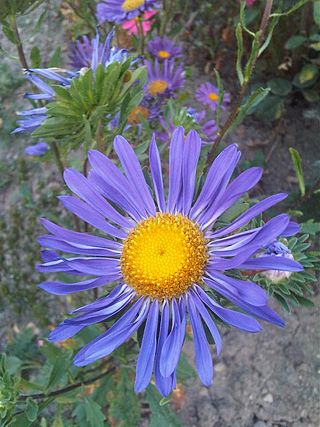
Callistephus is a monotypic genus of flowering plants in the aster family, Asteraceae, containing the single species Callistephus chinensis. Its common names include China aster and annual aster. It is native to China and Korea. and it is cultivated worldwide as an ornamental plant in cottage gardens and as a cut flower.

The longhorn beetles (Cerambycidae), also known as long-horned or longicorns, are a large family of beetles, with over 35,000 species described.

Cleroidea is a small superfamily of beetles containing over 10,000 species. Most of the members of the group are somewhat slender, often with fairly soft, flexible elytra, and typically hairy or scaly.
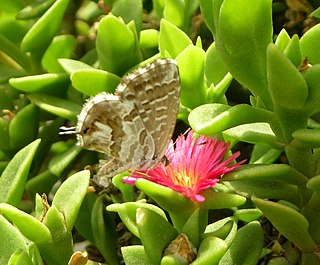
The geranium bronze or brun des pélargoniums in French, is a butterfly in the family Lycaenidae.

The alpine newt is a species of newt native to continental Europe and introduced to Great Britain and New Zealand. Adults measure 7–12 cm (2.8–4.7 in) and are usually dark grey to blue on the back and sides, with an orange belly and throat. Males are more conspicuously coloured than the drab females, especially during breeding season.

The red-winged starling is a bird of the starling family Sturnidae native to eastern Africa from Ethiopia to the Cape in South Africa. An omnivorous, generalist species, it prefers cliffs and mountainous areas for nesting, and has moved into cities and towns due to similarity to its original habitat.

Adansonia za is a species of baobab in the genus Adansonia of the family Malvaceae. It was originally named in French as anadzahé. Common names in Malagasy include bojy, boringy, bozy, bozybe, ringy, and za, the last of which gives the plant its specific epithet. Eight Adansonia species are recognized, with six endemic to Madagascar. Adansonia za is the most widespread of the Madagascar endemics.

Melyridae are a family of beetles of the superfamily Cleroidea.
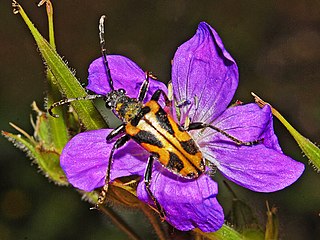
Brachyta interrogationis is the species of the Lepturinae subfamily in long-horned beetle family. This species was described in 1758 by Carl Linnaeus in the 10th edition of Systema Naturae under the name Leptura interrogationis.

Clytus rhamni is a species of round-necked longhorns belonging to the family Cerambycidae, subfamily Cerambycinae.
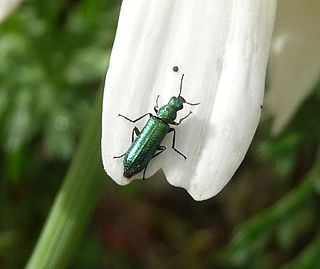
Psilothrix viridicoerulea is a species of soft-winged flower beetle belonging to the family Melyridae, subfamily Dasytinae.

Colletes hederae, the ivy bee, is a species of plasterer bee belonging to the family Colletidae subfamily Colletinae.
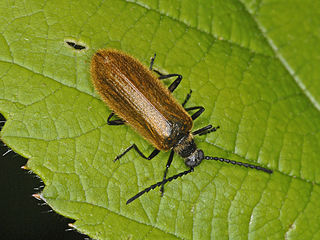
Lagria hirta is a species of beetles in the family Tenebrionidae.

Senecio ovatus, common name wood ragwort, is a perennial herbaceous plant belonging to the family Asteraceae.

Clanoptilus barnevillei is a species of beetles belonging to the family Melyridae, the soft-winged flower beetles.

Dasytes gonocerus is a species of soft wing flower beetles belonging to the family Melyridae.

Mycterus umbellatarum is a species of soft wing flower beetle in the family Mycteridae. It occurs in Europe and North Africa.




















